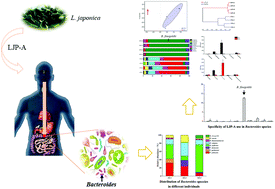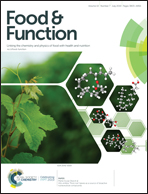The specific use of alginate from Laminaria japonica by Bacteroides species determined its modulation of the Bacteroides community†
Abstract
Accumulating studies showed that the beneficial actions of polysaccharides were closely associated with an improvement of the gut microbiota, but mechanisms that link polysaccharides and gut microbiota alterations are ill defined. Alginate from Laminaria japonica (LJP-A) can avoid being digested by the upper digestive tract and reach the colon where it can improve the gut microbiota community. LJP-A increased the relative abundance of some Bacteroidaceae members, e.g. Bacteroides species. The distribution of Bacteroides species in the gut is specific to the individual, and the specific use of LJP-A by Bacteroides species can determine LJP-A-induced alterations of the intestinal Bacteroides community, in which carbon source-based syntrophic interactions occur in Bacteroides species of the human gut microbial ecosystem. Compared to other species, Bacteroides finegoldii responded more positively to LJP-A intervention, and its properties may have a close connection with the bioactivities of LJP-A. This study provides a rationale for personalized treatment with dietary polysaccharides that were optimally fermented within a particular individual.



 Please wait while we load your content...
Please wait while we load your content...